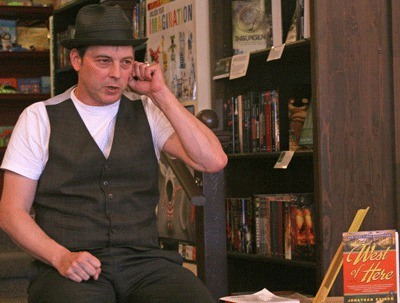By Kelsey Kennedy/special to the Journal
Acclaimed American novelist Jonathan Evison plays in a self-described high stakes game.
Clearly, the gamble paid off: “West of Here”, Evison’s latest novel, is a New York Times bestseller, ranked in Amazon’s top 100 books of 2011 and was the winner of the Pacific Northwest Booksellers Association Award for 2012.
After burying, literally, three earlier novels, Evison took a major risk when he chose to write “West of Here”- an expansive narrative of two generations living in the fictional town of Port Bonita on the Olympic Peninsula, in the 1890s and 2006. “West of Here” avoids typical linear progression and conventions of historical fiction, blending both the myths and truths involved in the settlement of the American west in its exploration of colorful characters, such as a Bigfoot enthusiast, a runaway ex-convict and a proto-feminist pioneer.
“The book is divisive. I wanted to frustrate and subvert historical fiction,” Evison said over a tumbler of Maker’s Mark bourbon, just before taking center-stage at a June 18 author event hosted by Griffin Bay Bookstore.
Evison, a resident of Bainbridge Island, Wash., sought to write an “egalitarian history” of the Pacific Northwest, relying on extensive research and interviews to complete this heavily character-driven, 500-page epic.
Evison, a critic of self-consciously “intellectual” works of literature that hold the audience at arm’s length, strives to construct narratives that allow the reader to fully embody the thoughts and feelings of his characters.
“The characters dictate where the story goes…it’s all about the characters,” he said. “A common theme [in my novels] is reinvention. It’s always about people trying to reinvent themselves, inching toward self-realization.”
Perhaps unsurprisingly, Evison’s emphasis on the self in his writing is inspired by the individualistic ethos of the Pacific Northwest.
“Rugged individualism is alive and well here….people shape the land and the land shapes people,” he said.
During his presentation at Griffin Bay Bookstore, Evison pointed to the community of San Juan Island, “where people live in isolation by choice,” as an example of the independent spirit that remains a source of commonality throughout the Pacific Northwest. Evison reminded his audience that residents of the Pacific Northwest have long been leaders in innovation, and vanguards in social movements, such as farmers’ markets and craft brewing.
Evison picks up on the literal and metaphorical exploration of the west in his forthcoming novel, “The Revised Fundamentals of Caregiving”, due out in August.
In “The Revised Fundamentals of Caregiving”, two unlikely companions, a widower, Ben, and a 19-year-old sufferer of Duchenne Muscular Dystrophy named Trev, take a road trip across the west to visit Trev’s ailing father.
Writing this novel was equally risky for Evison on a more personal level, and involved significant “emotional dredging” to bring the two troubled protagonists to life.
When asked what sustains him to keep working on often arduous book projects, Evison points to his insatiable desire to make sense of the world through the written word.
“Fortitude comes out of necessity,” he said. “If you can’t tell, I’m a little manic. Writing allows me to articulate the madness. I’d be doing this no matter what; I have to do it. I have to risk falling flat on my face and go somewhere completely different with each novel.”
— Kelsey Kennedy is a former Journal intern and Friday Harbor High School graduate, Class of 2008, and more recently, a graduate of Whitman College.




